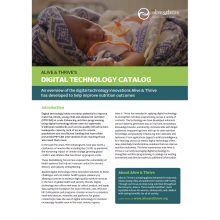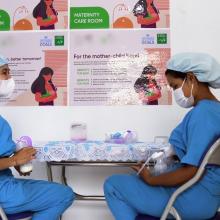Toolkit
Feb 01 2024

Alive & Thrive Digital Technology Catalog: An overview of the digital technology innovations Alive & Thrive has developed to help improve nutrition outcomes
Journal article
Jan 26 2024

Overpromoted and underregulated: National binding legal measures related to commercially produced complementary foods in seven Southeast Asian countries are not fully aligned with available guidance (Blankenship J, et al. Maternal & Child Nutrition. 2023)
Journal article
Jan 08 2024

Bridging the evidence-to-action gap: enhancing alignment of national nutrition strategies in Cambodia, Laos, and Vietnam with global and regional recommendations (Nguyen TT, Huynh NL, et al. Frontiers in Nutrition. 2024)
This journal article details Alive & Thrive’s examination of the alignment of recent National Nutrition Strategies and Action Plans (NNS) in Cambodia, Laos, and Vietnam with recent global and regional recommendations and standards with a focus on maternal, infant, and young child nutrition an
Journal article
Sep 12 2023

Right message, right medium, right time: powering counseling to improve maternal, infant, and young child nutrition in South Asia (Bhanot A, Sethi V, et al. Frontiers in Nutrition. 2023)
Quality counseling can positively impact maternal, infant and young child nutrition (MIYCN) behaviors linked to poor nutrition outcomes. Global guidance includes 93 recommendations on MIYCN counseling.
Journal article
Feb 07 2023

The political economy of infant and young child feeding: confronting corporate power, overcoming structural barriers, and accelerating progress (Baker P, Smith JP, et al, The Lancet. 2023)
Despite increasing evidence about the value and importance of breastfeeding, less than half of the world's infants and young children (aged 0–36 months) are breastfed as recommended. This Series paper examines the social, political, and economic reasons for this problem.
Video
Jan 12 2023

VIDEO: An introduction to Workplace Lactation Support programs
Some mothers who would like to continue breastfeeding are forced to stop so that they can return to work. Workplace Lactation Support programs are an effective way to address this problem.

